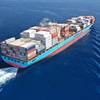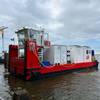USCG Warns Mariners of Shoaling in Merrimack River
The Coast Guard is urging mariners to use extreme caution while transiting the Merrimack River entrance due to significant shifting and shoaling between the #2 red and #3 green buoys.
Several recent accidents and near misses on the narrow, heavily congested portion of the Merrimack River have created a major safety concern. To help ensure the public has a safe and pleasurable boating experience, the Coast Guard, Massachusetts Environmental Police, Newburyport Harbormaster, and the Coast Guard Auxiliary will be conducting safety patrols on the Merrimack River bar, focusing on the river mouth.
"Our first priority is the safety of the boating public," said Senior Chief Petty Officer Mark Dilenge, officer in charge of Coast Guard Station Merrimack River in Newburyport, Massachusetts. He said the best way to ensure an enjoyable time on the water is to boat responsibly.
"Understanding boating laws, the safe operation of your vessel, the local area, and the rules of navigation are the best ways to keep you and your fellow boaters safe," he said.
Additionally, he shares these navigational rules to help avoid collisions on the river:
1. Know the Navigation Rules. - They are established by the implementation of International Regulations for Avoiding Collisions at Sea, and boaters are required to operate under them. Navigation rules can be found at http://www.navcen.uscg.gov/.
2. Establish a Lookout. (Rule 5) - Post a proper lookout to assess the surroundings and identify risks of collision.
3. Operate at a Safe Speed. (Rule 6) - Vessels should proceed at a safe speed that enables them to take proper and effective action to avoid collision.
4. Operating in Narrow Channels. (Rule 9) - When operating a vessel in a narrow channel, keep as far right as safely possible, avoid crossing or impeding another vessel's passage, and avoid anchoring in the channel.
As a final reminder, larger vessels may produce large wakes when they enter the bar - especially during the ebb tide. Operators of large vessels should aim to minimize their speed or come to bare steerage, especially when in a congested area, and smaller vessels should be aware that wakes may be unavoidable.










